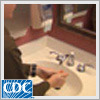This podcast is presented by the Centers for Disease Control and Prevention. CDC – safer, healthier people.
Hello. I'm Dr. John Jernigan from the Centers for Disease Control and Prevention. Your doctor has chosen to admit you to this facility because you need high quality medical care. The healthcare providers here want to do everything they can to help you get well and to avoid complications.
You came to the hospital to get well, but you should know that each year in the United States patients get more than a million infections in the hospital while they're being treated for something else.
Examples of infections patients can get in the hospital include infections in their bloodstream, surgical wound, or urinary tract, as well as pneumonia.
These infections can be serious and hard to treat, but there's one simple thing you and your family can do to help prevent these infections – wash your hands and make sure that everyone who touches you – including your doctor – cleanses their hands too.
Patients and their loved ones who take an active role and become involved in their treatment may have better experiences in the hospital than those who don't. In the following video, you'll see how easy it is to be involved in your care and make sure everyone around you washes their hands.
Hi, I'm Gayle. Now that you've been admitted to the hospital, I'm here to tell you about the single most important thing you can do to help prevent infections.
Everyone around you must practice proper hand hygiene. This means that people should wash their hands, either with soap and water or use an alcohol-based hand sanitizer. You and your loved ones should wash your hands very often, especially after touching objects or surfaces in the hospital room, before eating, and after using the restroom.
It is important that healthcare providers – including doctors and nurses – either wash their hands with soap and water or use an alcohol-based hand sanitizer every time, both before and after they touch you.
Healthcare providers know to practice hand hygiene, but sometimes they forget. You and your loved ones can play a role in asking and reminding healthcare providers to wash their hands, especially while they're caring for you. You shouldn't feel embarrassed to ask everyone, including doctors and nurses, to wash their hands. They really want to do all they can to help prevent you from getting an infection.
Let's check in on some patients…
Steven, I know that you washed your hands a little while ago, but would you mind washing them again?
Sure, Mom.
It's important to remember that healthcare providers aren't the only ones who need to practice hand hygiene. Patients and visitors should also wash their hands very often, especially after touching surfaces in the patient's room, before eating, and after using the restroom.
Our patient's son could have also used an alcohol-based hand sanitizer to cleanse his hands. Both of these practices can help prevent the spread of germs.
Let's take a look in another patient's room.
Hello. How is the patient doing today?
About the same, I think.
Well I'm just going to examine him briefly.
Doctor, I'm embarrassed to even ask you this, but would you mind cleansing your hands before you begin?
Oh, I washed them right before I came in the room.
If you wouldn't mind, I'd like you to do it again in front of me.
Sure, no problem.
Thanks doctor. I know how important hand hygiene is in preventing the spread of infections.
Your loved ones can play an important role in keeping you healthy by making sure that your healthcare providers wash their hands every single time they touch you.
Doctors and nurses don't mind being asked to wash their hands because they want to prevent infection as much as you do. I hope that you feel comfortable asking your healthcare providers to wash their hands.
I hope that you'll become involved in your medical care by reminding everyone, especially your healthcare providers, to wash their hands.
Please remember:
You can get an infection in the hospital while you're being treated for something else.
You can help prevent infections by asking your doctors, nurses, and visitors to wash their hands.
Doctors and nurses encourage you to remind them to wash their hands.
Thank you for your attention and I wish you a speedy and uneventful recovery.
(VIDEO TEXT):
for more information, please visit: www.cdc.gov/handhygiene or call: 800-CDC-INFO (800-232-4636)
this video was brought to you by:
U.S. Department of Health and Human Services
Centers for Disease Control and Prevention
in collaboration with:
the Association for Professionals in Infection Control & Epidemiology
Safe Care Campaign
special thanks to:
Emory-Adventist Hospital
Emory University Hospital
with support from:
the CDC Foundation
Kimberly-Clark
For the most accurate health information, visit www.cdc.gov or call 1-800-CDC-INFO, 24/7.



